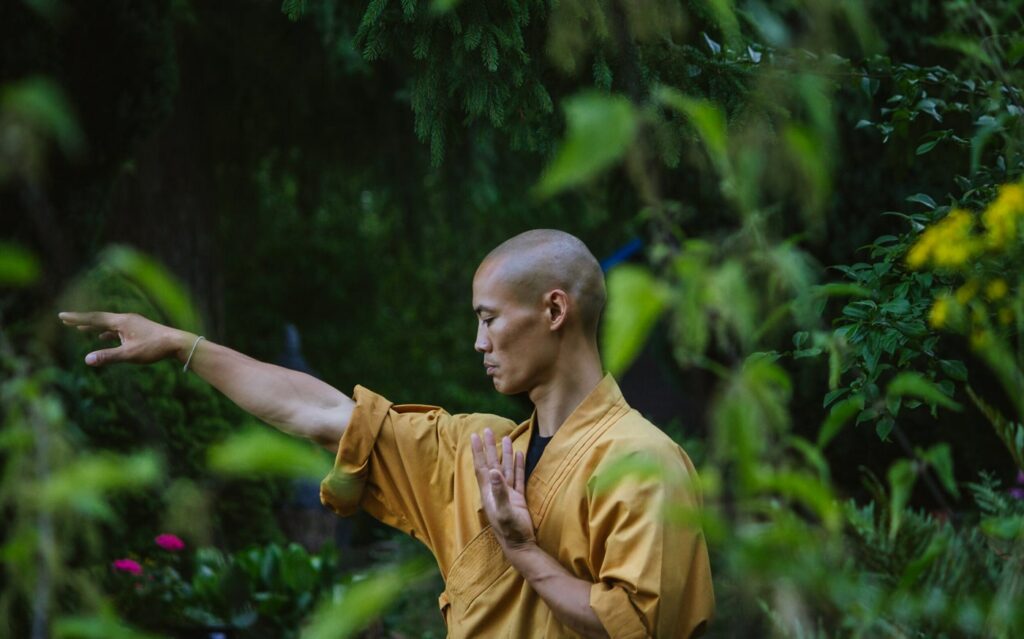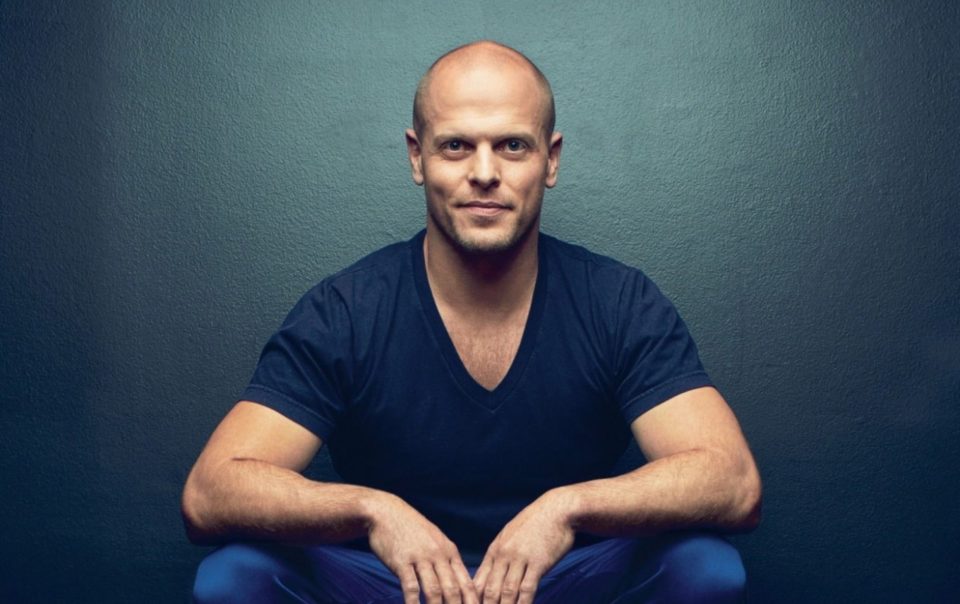
5 Hindrances to self-mastery เป็นเรื่องเกี่ยวกับ 5 อุปสรรคจัดการได้ด้วยการควบคุมตนเอง โดย Master Shi Heng Yi ท่านได้พูดเอาไว้ในงาน TEDxVitosha เมื่อปี 2020
5 อุปสรรคจัดการได้ด้วยการควบคุมตนเอง
Master Shi Heng Yi เล่าเรื่องนึงที่น่าสนใจให้เราฟังว่า ชายคนหนึ่งอาศัยอยู่ใกล้กับภูเขา เขาเฝ้าคอยสงสัยมาตลอดว่าหากได้ขึ้นไปบนยอดเขานั้น เขาจะมองเห็นอะไรบ้าง? จนในที่สุดวันที่เขาออกเดินทางก็มาถึง ขณะที่ชายคนนี้กำลังเดินทางขึ้นภูเขา เขาได้พบกับนักเดินทางคนหนึ่ง เขาจึงถามนักเดินทางคนนั้นเกี่ยวกับเส้นทางขึ้นเขาที่นักเดินทางคนนี้ใช้และภาพที่ได้เห็นจากยอดเขา หลังจากที่ได้ฟัง ชายคนนี้ก็รู้สึกว่าเส้นทางที่นักเดินทางคนนี้เลือกไปดูเหนื่อยยากมากเหลือเกิน เขาจึงเดินทางต่อไปและพบนักเดินทางคนที่ 2 แน่นอนว่าเขาก็เข้าไปถามนักเดินทางคนนี้เกี่ยวกับเส้นทางและวิวที่เห็นจากยอดเขาเช่นกัน เขาทำแบบเดียวกันนี้กับนักเดินทางอีก 28 คน และหลังจากที่ชายคนนี้ได้ถามคำถามเดิมกับคนที่ 30 เสร็จ ชายคนนี้ก็ตัดสินใจเลือกที่จะไม่ขึ้นไปบนภูเขา แล้วหันหลังเดินกลับบ้าน เพราะเขาบอกว่าเขารู้เส้นทางและวิวบนยอดเขาหมดแล้วจากนักเดินทางทั้ง 30 คนที่เขาได้สอบถามมา
เรื่องนี้สอนหรือให้แง่คิดอะไรกับเราบ้าง?
ประสบการณ์ของคนอื่น ย่อมไม่มีทางเหมือนกับประสบการณ์ที่เราจะได้รับอย่างแน่นอน มุมมองและความคิดของคนอื่น ก็ย่อมไม่เหมือนกับเราอย่างแน่นอน การถามคนอื่นมาก ก็เป็นอุปสรรคขัดขวางการเดินทางสู่เป้าหมายของชีวิตได้เช่นเดียวกัน

“เมื่อคุณเติบโตมาในครอบครัวเอเชีย คุณจำเป็นจะต้องเลือกที่จะเป็นหมอ วิศวกร หรือทนายความ เท่านั้น”
Master Shi Heng Yi ใช้ชีวิตอยู่ที่ในประเทศเยอรมันก่อนจะเข้าเรียนที่วัดเส้าหลิน ท่านเรียนจบด้านวิชาการในระดับปริญญาจากมหาวิทยาลัย 2 แห่ง จบบริหารธุรกิจในระดับปริญญาโท มีประกาศนียบัตรและอนุปริญญามากมาย ตามแบบฉบับที่พ่อแม่ชาวเอเชียทุกคนต้องการ ตามหลักการที่ครอบครัวอยากให้ลูกต้องเป็นหมอ วิศวกร หรือทนายความ เพื่อให้พ่อแม่มีความสุขที่สุด แต่มันน่าแปลก ที่ท่านกลับรู้สึกว่ามันมีบางสิ่งบางอย่างที่ขาดหายไป
“การสำรวจและค้นพบตัวเอง คือส่วนที่ขาดหายไปจากวิชาเรียน”
Master Shi Heng Yi ได้ค้นพบว่า แม้แต่ตัวท่านเองจะเรียนจบจากหลายสถานการศึกษาและหลายสาขาวิชา แต่กลับรู้สึกเหมือนยังมีส่วนที่ขาดหายไป และสิ่งนั้นก็คือ การสำรวจและค้นพบตัวเอง ท่านมีโอกาสได้รู้จักสถานที่ปฏิบัติศาสนกิจครั้งแรกตอน 4 ขวบ ซึ่งการฝึกปฏิบัติเป็นการพัฒนาพฤติกรรมควบคู่ไปกับการฝึกทางกายภาพ ถูกดำเนินไปโดยมีเป้าหมายให้ผู้ปฏิบัติได้ลองสำรวจและค้นพบตัวเอง ปัจจุบันเป็นที่รู้จักกันก็คือ เส้าหลินกังฟู ตัวท่านเองได้เรียนการฝึกฝนและพัฒนาตนเอง ซึ่งเป็นการได้ใช้เวลาอย่างเพลิดเพลินแม้จะไม่ได้ทำอะไรเลย สิ่งสำคัญของขั้นตอนนี้คือหาวิธีค้นพบตัวเองให้เจอและเลือกทำสิ่งที่คุณชอบทำเท่านั้นเอง
“ความชัดเจนหมายถึงการที่คุณมองเห็นได้ชัดเจนยิ่งขึ้น เมื่อคุณเห็นชัดเจนขึ้นความสัมพันธ์ก็จะชัดเจนขึ้น”
จากเรื่องชายผู้นั้นที่บ้านอยู่ใกล้กับภูเขาสูง สิ่งที่เราได้เรียนรู้ คือนักเดินทางทุกคนมักหาวิธีที่เหมาะสมที่สุดเพื่อไปให้ถึงยอดเขาที่พวกเขาต้องการ 30 คน ก็จะมีวิธี 30 วิธี และเป็นไปได้ที่นักเดินทางทั้ง 30 คนนั้นจะแบ่งปันข้อมูลที่พวกเขาค้นพบและวิธีการที่พวกเขาใช้ แต่เป็นไปไม่ได้เลยที่พวกเขาจะแบ่งปันประสบการณ์ที่ได้เห็นจากการยืนบนยอดเขานั้นอย่างชัดเจน
“ความชัดเจนคุณจะได้ก็ต่อเมื่อ คุณได้สัมผัสมันด้วยตัวเอง”
เมื่อคุณสามารถเห็นด้วยตาตัวเองอย่างชัดเจน คำพูดหรือประสบการณ์ที่ได้มาจากคนอื่นก็ไม่จำเป็นอีกต่อไป ไม่ว่าจะฟังจากใคร หรืออะไร การรับมาเองนั้นมีความชัดเจนมากที่สุด คุณจะสามารถหาทางที่ดีที่สุดและเหมาะสมที่สุดสำหรับคุณในการขึ้นเขาด้วยตัวเอง โดยไม่ต้องฟังว่าทางของคนอื่นมันเหนื่อยหรือสบายมากแค่ไหน และคุณจะได้เห็นวิวจุดสูงสุดของภูเขาลูกนั้นด้วยตัวเอง โดยไม่ต้องฟังใครบรรยายถึงความสวยหรือความคุ้มค่าที่ได้ขึ้นไป

ตลอดการเดินทางคุณอาจได้พบกับความท้าทายที่พุ่งเข้าใส่ บางความท้าทายอาจขัดขวางไม่ให้คุณเดินทางไปต่อจนถึงยอดเขา ที่วัดเส้าหลินเรียกความท้าทายเหล่านี้ว่า “5 อุปสรรค หรือ 5 Hindrances” เป็นการอธิบายถึงสภาวะของจิตใจที่แตกต่างกันใน 5 รูปแบบ ซึ่งส่งผลต่อการมองเห็นให้ชัดเจนและแน่นอนว่ามันส่งผลต่อการตัดสินใจให้ถูกต้องของคุณด้วย
1. Sensual desire ความต้องการทางอารมณ์ : ความต้องการทางอารมณ์เกิดขึ้นเมื่อคุณให้ความสนใจกับบางสิ่งที่ทำให้คุณเกิดอารมณ์เชิงบวก โดยอารมณ์เชิงบวกนี้จะเกิดขึ้นได้จากการเปิดประตูทั้ง 5 บานของร่างกายเรา ได้แก่ เห็น ได้ยิน ดมกลิ่น ชิม และความรู้สึก ยกตัวอย่างเช่น หากระหว่างทางที่คุณปีนเขา คุณพบร้านอาหารร้านหนึ่งที่ตกแต่งสวยงามมาก ผู้คนที่เข้าไปรับประทานอาหารก็ดูดี กลิ่นอาหารหอมหวนชวนให้เข้าไปใช้บริการ เมื่อคุณก้าวเข้าไปในร้านนั้นเท่ากับว่าคุณกำลังหลงทางแล้ว และหากคุณหลงเข้าไปโดยไม่อยากออกมาอีกเท่ากับว่าคุณได้เปลี่ยนความต้องการทางอารมณ์ให้กลายเป็นความหมกหมุ่นและได้ละทิ้งเป้าหมายไปแล้ว
2. Ill will / Aversion ความประสงค์ร้าย : ความประสงค์ร้ายเกิดจากสภาวะอารมณ์เชิงลบ คุณมีความเกลียดชัง มีการปฏิเสธ หรือความรู้สึกไม่ชอบภายในจิตใจ ยกตัวอย่างเช่น ขณะที่คุณกำลังเดินทางขึ้นไปสู่ยอดภูเขา ปรากฏว่าฝนตกลงมาเสียอย่างนั้น และคุณไม่ชอบฝน ไม่ชอบถนนที่เป็นหลุมบ่อหลังจากฝนตก ไม่ชอบความเฉอะแฉะ และไม่ชอบที่ฝนทำให้การเดินทางไม่ราบรื่นเอาเสียเลย ตอนนี้มีโอกาสสูงมากที่การเดินทางของคุณจะล้มเหลว เว้นเสียแต่ว่าคุณจะโยนความไม่ชอบทิ้งไปแล้วเดินหน้าต่อ
3. Dullness / Heaviness ความเกียจคร้านและความทรมาน : ความเกียจคร้านและความทรมานเกิดขึ้นเมื่อคุณรู้สึกง่วงนอน ขาดแรงจูงใจในการไปต่อ ขาดพลังงาน และบ่อยครั้งก็แสดงออกมาในรูปแบบของอาการซึมเศร้าได้ ทางพระพุทธศาสนาจะกล่าวได้ว่าความเกียจคร้านนั้นเป็นเสมือนคุกหรือหลุมที่กักขังเราไว้ ทางเดียวที่ทำได้หากคุณไม่ต้องการอยู่ในคุกหรือหลุมบ่อนั้น คือดึงตัวเองขึ้นมา แล้วเดินหน้าต่อ เพราะไม่มีใครสามารถช่วยคุณได้ดีไปกว่าการช่วยตัวเอง
4. Restlessness ความกระสับกระส่าย : ความกระสับกระส่ายเกิดขึ้นในสภาวะที่จิตใจของเราไม่สงบ จิตใจที่ไม่สงบคือจิตใจที่ไม่ได้อยู่ในปัจจุบัน คอยจะแวะเวียนคิดถึงเรื่องในอดีต สิ่งที่ผ่านไปแล้วไม่สามารถกลับไปแก้ไขได้ หรือคิดเผื่อไปถึงอนาคตที่ยังมาไม่ถึงและไม่อาจรู้ได้เลยว่าจะเป็นอย่างไร พระพุทธศาสนาจะเรียกอาการแบบนี้ว่า จิตใจลิง ลิงจะกระโดดห้อยโหนไปยังกิ่งไม้ข้างหน้าหรือกิ่งไม้ข้างหลังที่โหนผ่านแล้วตลอดเวลา ไม่สามารถอยู่กับกิ่งไหนได้นานแม้แต่กิ่งที่อยู่ในปัจจุบัน เพราะฉะนั้นเมื่อจิตใจกระสับกระส่ายขาดความสงบ จึงไม่มีเวลามากพอที่จะมองสิ่งใดให้ชัดเจนได้
5. Skeptical doubt ความสงสัย : ความสงสัยเกิดขึ้นเมื่อจิตใจของคุณไม่มีความแน่วแน่ คุณไม่ได้เชื่อในตัวเอง แต่เอนเอียงไปตามสิ่งต่างๆที่เข้ามา ถ้าไปทางนี้จะดีไหม? คนอื่นจะคิดอย่างไร? ถ้าเป็นคนอื่นจะเลือกทางแบบเราไหม? เมื่อความสงสัยมีมากเกินไป มันจะทำให้ความทะเยอทะยานที่คุณมีต่อเป้าหมายที่ตั้งไว้ลดลง บ่อยครั้งที่ความสงสัยจะทำให้คุณหยุดแทนที่จะไปต่อ

บทสรุป
เมื่อคุณรู้และเข้าใจอุปสรรคทั้ง 5 ที่จะเกิดขึ้นกับคุณแล้ว โปรดรู้ไว้ว่าหากคุณไม่กำจัดมันทิ้งไป มันจะสร้างหมอกเมฆหนาในจิตใจคุณ ในเส้นทางการเดินขึ้นภูเขาลูกนั้นของคุณ สิ่งที่จะช่วยขจัดมันออกไปได้คือ การรับรู้ การยอมรับ การตรวจสอบ และการไม่ระบุตัวตน กล่าวได้ว่าคุณจะต้องรับรู้ว่าตัวคุณกำลังทำอะไร รับรู้สภาวะของจิตใจที่กำลังค้นหาตัวเอง หลังจากนั้นเรียนรู้ที่จะยอมรับว่าสิ่งต่างๆ เกิดขึ้นเพียงเพราะมันแบบนั้น สถานการณ์หรือบุคคลทั้งหมดไม่ว่าจะถูกใจคุณหรือไม่ แต่ทำเพียงแค่ยอมรับและปล่อยให้มันเป็นอย่างที่เป็น
เมื่อคุณยอมรับสิ่งต่างๆ รอบตัวได้ ให้คุณหันกลับมามองตัวเอง ตรวจสอบสภาวะทางจิตใจของตัวเอง และสุดท้ายการไม่ระบุตัวตน หมายถึงการปฏิบัติ ตระหนักไว้ว่าร่างกาย จิตใจ และอารมณ์ไม่ใช่ของคุณ คุณเป็นเพียงคนที่ได้รับรู้สิ่งเหล่านั้นทั้ง 3 ด้านเท่านั้น
เพราะชีวิตของเราทุกคนล้วนมีเอกลักษณ์เฉพาะตัวที่แตกต่างกันไป ความหลากหลายตรงนั้นสร้างความเฉพาะให้แต่ละคน เพราะฉะนั้นทุกคนมีความโดดเด่นและความแตกต่างที่สวยงามตามแบบฉบับของตัวเองเกินกว่าที่เราจะคัดลอกเส้นทางชีวิตของคนอื่นได้ เพื่อที่จะได้พบความหมายและคุณค่าของชีวิตตัวเอง คุณจำเป็นต้องค้นหา เรียนรู้และเชี่ยวชาญเรื่องตัวเองให้ได้เสียก่อน คุณจะค้นพบเส้นทางในการไปถึงจุดสูงสุดของภูเขาด้วยตัวเองและคุณจะเป็นคนตัดสินเองว่าวิวจากจุดสูงสุดของภูเขาที่คุณเฝ้าสงสัยมันสวยงามเพียงใด
“ในการบรรยายครั้งนี้ คุณจะได้รับแรงบันดาลใจมากมายจากนักเดินทางหลากหลายคน แต่ในการบรรยายครั้งนี้ฉันไม่สามารถแนะนำและจะไม่บอกคุณว่าควรไปทางไหน”
Master Shi Heng Yi – 5 hindrances to self-mastery | Shi Heng YI | TEDxVitosha







